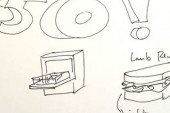
Whenever Lenny Dykstra is charged with a crime, as he was yesterday on “25 misdemeanour and felony counts of grand theft auto, attempted grand theft auto, identity theft and other crimes,” I can’t help but marvel at his luck. Obviously it’s bad right now. Or is it? The latest indictment comes on the heels charges filed this May alleging Dykstra hid over $400,000 in property from your bankruptcy trustees, so I’m not sure luck has all that much to do with it.
It’s possible Lenny might just deserve everything that’s happening to him. The irony here, I believe, is that if many people, not only Dykstra, had been able to tell the difference between “Lenny’s luck” and “Lenny’s just deserts” and how little ‘deserve’ had anything to do with his post-baseball success, he might never be in this pickle.
Just so we all know what the hell I’m talking about, this is Lenny Dykstra in his playing days with the Philadelphia Phillies.
And this is how we was described in a 1993 profile in Philadelphia Magazine:
“Watching Lenny Dykstra gamble is like having an orchestra seat at a one-character David Mamet tragicomic psychodrama. You are appalled and delighted by the language and the largesse, the exposed and tortured soul. You enjoy the ride. You know it will end badly.”
Here’s how we was described in a 2008 New Yorker profile:
“He is lumpy now… His hands tremble, his back hurts, and his speech, like that of an insomniac or a stroke victim, lags slightly behind his mind. He winks without obvious intent.”
“Dykstra’s laptop stalled. Like many latecomers to computing, his instinctive reaction, when faced with a balky Web page or a frozen screen, is to click furiously and open more windows, thereby exacerbating the problem.”
Going by that alone, if Lenny Dykstra offered you investment advice, you might not take it. But the focus of the New Yorker profile was, as its subtitle accurately described it, “Baseball’s most improbable post-career success story.” Improbable because, once again, this is Lenny Dykstra. This guy had become a stock-picking prodigy on Jim Cramer’s thestreet.com, racking up an “83-0” record in his “Nails on the Numbers” column. This guy was teaming up with AIG (AIG!) on a plan to sell annuities to pro athletes. According to the New-Freaking-Yorker (and, in fairness, a bunch of other publications) somehow Lenny Dykstra’s true talent wasn’t bowling over catchers, it was complicated financial analysis.
No one stopped to consider that, in the booming pre-recession stock market, picking one rising stock a week could easily be chalked up to luck.* Nope. Lenny “Nails” Dykstra, in spite of all evidence to the contrary, had to be a genius. There was no other explanation. Until, of course it all came crashing down and more and more stories emerged to show, without the distracting glamour of streaks and flowing cash, just how fallible (and lucky, good or bad) Dykstra actually was.
But would the ending of this story be different if someone had figured this out before it all went haywire? If rather than reinforcing the sense of entitlement in what appears to be a very borderline personality, someone had instead given him even a little bit of perspective? It’s likely Dykstra would have become just like you or me, but it’s also possible he wouldn’t have wound up indicted, bankrupt, divorced, living in his car, pawning his World Series ring, accused of ripping off Wayne Gretzky, and accused of bouncing a cheque he wrote to an escort. Woe be unto him who mistakes luck for merit, it seems.
And though I am hyper-conscious of the perils of this sort of hubris, I have certainly been guilty of it myself. In my apartment-dwelling days, I had a particularly robust streak of predicting when the laundry room would be fairly empty and I could wash my things and avoid stilted chit-chat with Ann Rohmer, who, judging by the frequency with which I ran into her, might have been living in the laundry room.
I don’t know if I went 83-0, but I was good, which allowed me to ignore the few times I was only able to use one machine instead of the two I needed. But when my luck swung the other way and I started being completely shut out on a regular basis, I began to recognize my luck, good or bad, for what it was. And I began, during my long, crestfallen elevator rides back up to the apartment, overstuffed Ikea bag of dirty togs in tow, to imagine ways I could take luck out of the equation.
At the time, I just wanted a laundry room camera, much like the lobby camera we had hooked up to channel 59 on our TV. Push CPAC up a few more numbers and give me shots of how many washers and dryers were in use or how many minutes remained in their cycles. But that was a few years ago and Lenny Dykstra’s indictment today inspired me to reflect upon how expanding data networks might improve my idea.
At its most basic, a networked laundry room could simply tell you, via either a website or a smartphone app, which machines are free and which are in use, as well as how many minutes are remaining on them. But since more and more laundry rooms use smart cards for payments, wouldn’t it be possible, similar to zipcar, to reserve the next cycle on dryer number eight, which should be free in eight minutes? Or book two machines for Monday at 8 pm well in advance? Your card becomes the key, unlocking the machine for your exclusive use.
The network could even analyze its usage patterns and introduce dynamic market pricing, charging more for premium times like midweek evenings, and slashing prices for 3 am wash sessions. I’m sure there are small practicalities to address, like what happens when your dryer cycle is finished but your jeans aren’t completely dry and someone has already booked the next cycle. But I’m sure the smart people at Coinamatic can figure it out. And then they can cut me in on the profits. Not because I deserve it, though. Just because I’m lucky they’re such generous people.
*Similarly, no one stopped to think that possibly, as has been alleged, Dykstra wasn’t making those picks himself.
Ideas Free to a Good Home is a clearinghouse of ideas we’re to lazy to develop ourselves.
















